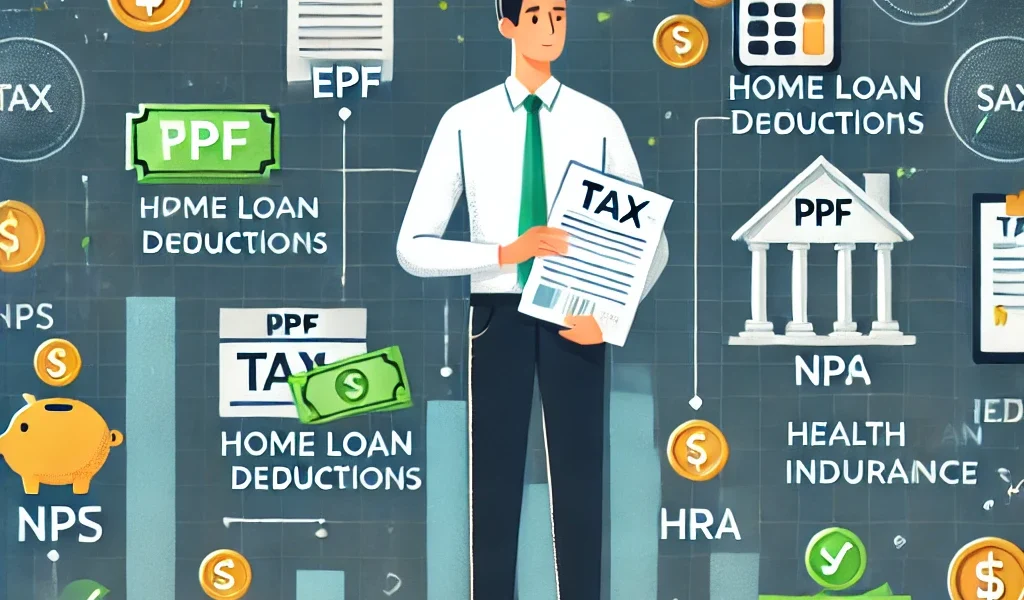Tax planning is a crucial aspect of financial management for salaried professionals. A well-planned tax strategy can help individuals maximize savings while staying compliant with legal requirements. This comprehensive guide explores smart tax-saving strategies, ensuring you optimize your income without facing any legal complications.
1. Understanding the Basics of Taxation for Salaried Individuals
Before diving into tax-saving strategies, it’s essential to understand the fundamental aspects of taxation applicable to salaried individuals:
- Income Tax Slabs: Tax rates vary based on income levels. India offers both old and new tax regimes, each with different benefits.
- Exemptions vs. Deductions: Exemptions reduce taxable income (e.g., HRA), whereas deductions reduce the tax payable (e.g., Section 80C deductions).
- Form 16 & ITR Filing: Form 16 is provided by the employer and is necessary for filing Income Tax Returns (ITR).
2. Choosing Between the Old and New Tax Regime
The Government of India introduced the New Tax Regime in Budget 2020, offering lower tax rates but removing most deductions. Here’s a comparison:
| Feature | Old Tax Regime | New Tax Regime |
|---|---|---|
| Standard Deduction | Yes (₹50,000) | No |
| 80C Deductions | Yes (up to ₹1.5L) | No |
| Lower Tax Rates | No | Yes |
Which One to Choose?
- If you avail multiple deductions (80C, 80D, HRA, etc.), the Old Regime may be better.
- If you don’t claim deductions, the New Regime with lower tax rates might be beneficial.
3. Maximizing Tax Savings Under Section 80C
Section 80C allows deductions up to ₹1.5 lakh. Here are some of the best tax-saving options:
- Employee Provident Fund (EPF): Mandatory for salaried employees, with tax-free interest.
- Public Provident Fund (PPF): A long-term savings option with tax-free returns.
- National Pension System (NPS): Additional deduction of ₹50,000 under Section 80CCD(1B).
- Equity Linked Savings Scheme (ELSS): Offers high returns with a 3-year lock-in period.
- Tax-Saving Fixed Deposits: A safe investment option with a 5-year lock-in.
4. House Rent Allowance (HRA) Exemption
If you live in a rented house, you can claim HRA exemption under Section 10(13A).
Conditions for HRA Exemption:
- You must be paying rent and have a valid rental agreement.
- If your annual rent exceeds ₹1 lakh, you must provide the landlord’s PAN.
- The exemption is calculated as the minimum of the following:
- Actual HRA received
- 50% of salary (for metro cities) / 40% (for non-metro cities)
- Rent paid – 10% of salary
5. Deductions on Home Loan Interest & Principal Repayment
Buying a house? You can avail tax benefits on home loans:
- Section 80C: Deduction up to ₹1.5 lakh on principal repayment.
- Section 24(b): Deduction up to ₹2 lakh on interest paid.
- Section 80EEA: Additional ₹1.5 lakh deduction for first-time home buyers (conditions apply).
6. Health Insurance & Medical Expenses (Section 80D)
Health insurance is essential, and the government offers tax deductions under Section 80D:
| Who is Covered? | Maximum Deduction |
| Self, Spouse & Children | ₹25,000 |
| Parents (Below 60 Years) | ₹25,000 |
| Parents (Above 60 Years) | ₹50,000 |
Additionally, deductions are available for preventive health check-ups (₹5,000 within the limit).
7. Tax-Free Allowances & Perquisites
Many employers offer tax-free allowances, such as:
- Leave Travel Allowance (LTA): Covers travel expenses within India (twice in four years).
- Food Coupons: Tax-free up to ₹50 per meal.
- Mobile & Internet Reimbursement: If provided for official use.
- Standard Deduction: Fixed ₹50,000 deduction available to all salaried individuals.
8. Investing in National Pension System (NPS) for Additional Tax Benefits
Apart from 80C benefits, the NPS offers:
- Section 80CCD(1B): Additional ₹50,000 deduction.
- Employer’s Contribution: Up to 10% of salary is tax-free under Section 80CCD(2).
9. Education Loan Interest Deduction (Section 80E)
If you or your child has taken an education loan, the interest paid is fully deductible under Section 80E for up to 8 years.
10. Charitable Donations (Section 80G)
Donations to registered charities are eligible for deductions:
- 100% Deduction: PM CARES Fund, National Relief Fund, etc.
- 50% Deduction: Other recognized charities (with limits).
Ensure donations are made via cheque, demand draft, or digital modes (not cash over ₹2,000).
11. Saving Taxes on Capital Gains
Capital gains from stocks, real estate, or mutual funds are taxable. Tax-saving options include:
- Investing in Capital Gains Bonds (Section 54EC) for real estate gains.
- Reinvesting in Residential Property (Section 54) to avoid real estate capital gains tax.
- Long-Term Capital Gains (LTCG) Exemption: Equity investments up to ₹1 lakh per year.
12. Avoiding Common Tax Mistakes
- Not Filing ITR on Time: Late filing attracts penalties.
- Mismatch in Form 16 & ITR: Ensure accuracy before filing.
- Not Declaring Additional Income: Side income, freelancing earnings, and interest must be declared.
Conclusion
A well-planned tax strategy can significantly reduce your taxable income while ensuring legal compliance. By leveraging exemptions, deductions, and smart investment choices, salaried professionals can optimize tax savings efficiently.
Remember: Tax laws are subject to changes, so always stay updated and consult a tax professional for personalized advice.




